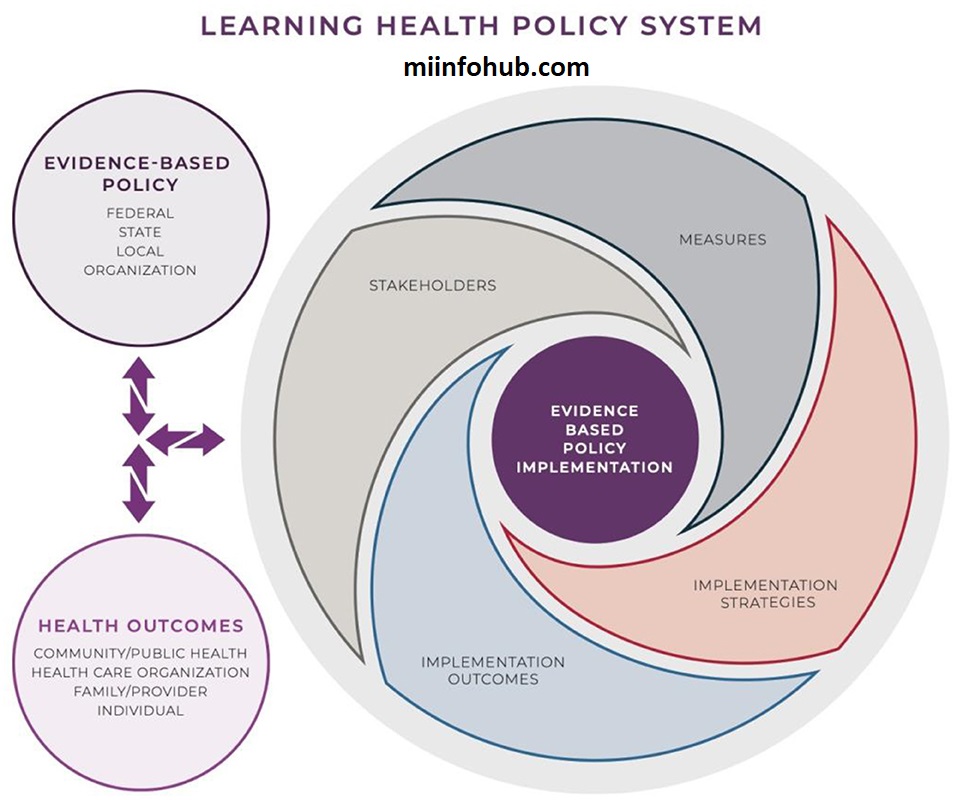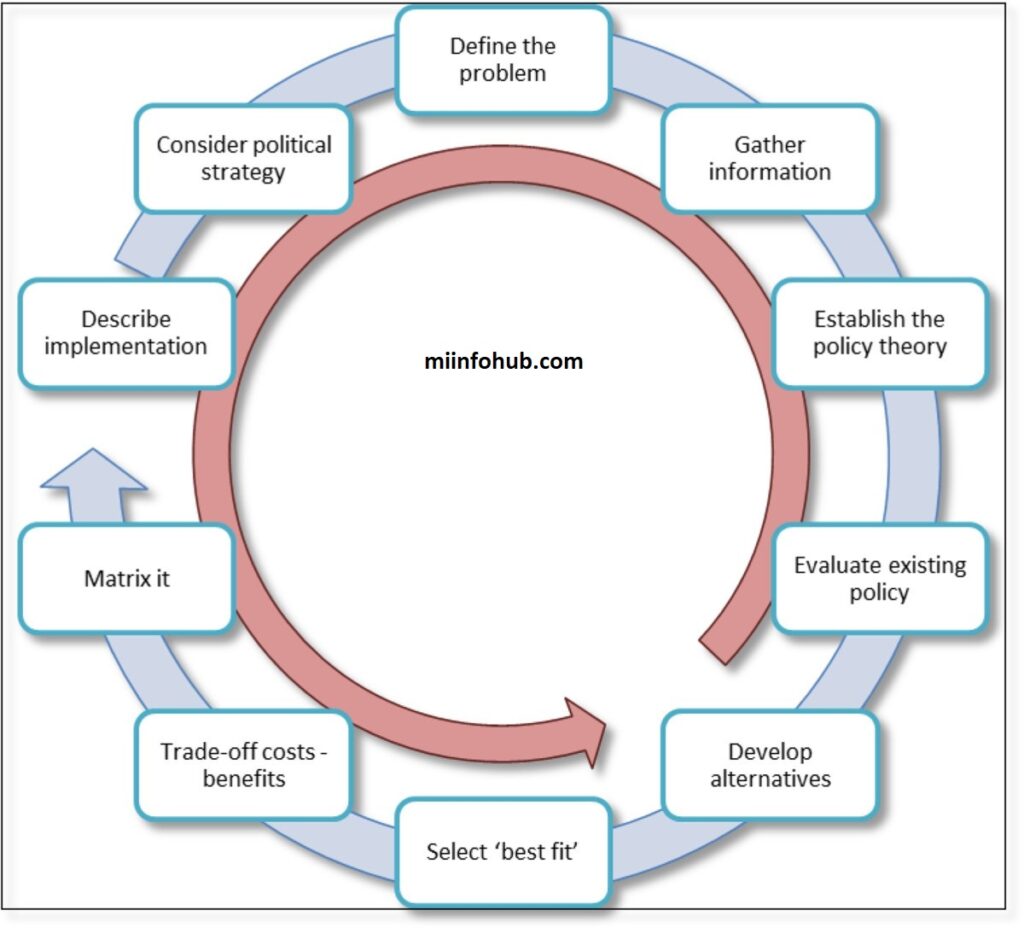What Is Health Policy?
Health policy refers to decisions that affect health care and public health. It includes laws and guidelines that shape health systems. The main goals are to improve health outcomes and ensure access to care. Key stakeholders include governments, health care providers, and the public. Current trends focus on technology, mental health, and health equity. Overall, health policy plays a vital role in shaping how we deliver and access health services.

Why Health Policy Is Important?
Health policy plays a crucial role in shaping the health care system and influencing public health outcomes. It establishes guidelines and regulations that ensure access to quality health care services for individuals and communities. By addressing issues such as affordability, quality of care, and health equity, effective health policies can reduce health disparities and improve overall population health.
Moreover, health policy is essential for responding to emerging health challenges, such as pandemics and chronic diseases. It helps prioritize resources, implement preventive measures, and enhance public health infrastructure. Furthermore, health policy fosters innovation by promoting research and development in new treatments and technologies, ultimately leading to better health outcomes.

Types Of Health Policy
- Public Health Policy: This type focuses on protecting and improving the health of populations through disease prevention, health promotion, and health education initiatives. Examples include vaccination programs, smoking cessation campaigns, and health screenings.
- Health Care Policy: This encompasses policies related to the organization, delivery, and financing of health care services. It includes regulations on health insurance, reimbursement rates, and access to care.
- Mental Health Policy: This type addresses the mental health needs of individuals and communities, promoting access to mental health services, reducing stigma, and integrating mental health care into primary health systems.
- Pharmaceutical Policy: This focuses on the regulation and accessibility of medications, including pricing, approval processes, and the promotion of generic drugs to ensure affordable access to necessary treatments.
- Environmental Health Policy: This type addresses the relationship between environmental factors and health outcomes, focusing on regulations to reduce pollution, manage waste, and promote clean air and water.
- Global Health Policy: This encompasses international efforts to address health issues that transcend national borders, such as pandemics, infectious diseases, and health equity, promoting collaboration among nations and organizations.
- Health Equity Policy: This type aims to address disparities in health outcomes among different populations, focusing on social determinants of health and promoting equitable access to care for marginalized groups.
Health Policy For Workers
- Occupational Safety And Health Policies: These regulations, often enforced by government agencies, establish standards to protect workers from hazards. They cover various aspects, including workplace safety protocols, equipment standards, and emergency preparedness plans.
- Mental Health Support: Increasingly, policies focus on promoting mental health in the workplace. This includes providing access to counseling services, implementing employee assistance programs, and fostering a supportive work environment that prioritizes mental well-being.
- Health Insurance Benefits: Many health policies for workers include provisions for health insurance coverage. This ensures that employees have access to medical care, preventive services, and necessary treatments without financial burden.
- Workplace Wellness Programs: These initiatives promote healthy lifestyles among employees. They may include fitness programs, nutrition education, and stress management workshops, encouraging workers to prioritize their health.
- Sick Leave And Family Leave Policies: Policies that provide paid sick leave and family leave are essential for worker health. They allow employees to take time off for illness or family responsibilities without risking their job security.
- Return-To-Work Programs: These policies assist workers in transitioning back to their jobs after illness or injury. They provide necessary accommodations and support to ensure a smooth reintegration into the workplace.
Current Trends In Health Policy
Current trends in health policy highlight significant changes in the health care landscape. The rise of telehealth, accelerated by the COVID-19 pandemic, has led to policies supporting remote consultations and reimbursement for virtual care. There is a growing emphasis on integrating mental health services into primary care and addressing health equity by focusing on social determinants of health. Additionally, the shift towards value-based care prioritizes quality outcomes over service volume. Public health preparedness and the impact of climate change on health are also key concerns driving new policies. Furthermore, rising pharmaceutical costs have sparked discussions on pricing transparency and access to affordable medications, reflecting a commitment to creating more effective and equitable health care systems.
Impact Of Technology On Health Policy
Technology significantly influences health policy by transforming care delivery and management. Advancements like telemedicine, electronic health records (EHRs), and mobile health applications enhance access to care, particularly for underserved populations, enabling remote consultations and patient engagement. Health policies are evolving to integrate these technologies, ensuring adequate reimbursement for telehealth services and establishing regulations to protect patient privacy and data security.
Furthermore, data analytics and artificial intelligence (AI) are shaping policy decisions by providing insights into patient outcomes and optimizing resource allocation. The COVID-19 pandemic underscored the importance of technology in health policy, as rapid innovations were necessary to respond effectively to the crisis. Overall, technology enhances health care access and outcomes while driving the need for regulatory frameworks that prioritize patient safety and privacy.
Global Health Policy Challenges
Global health policy faces several significant challenges impacting health systems worldwide. One major issue is the unequal distribution of health resources, leading to disparities in access to care and health outcomes between high-income and low-income countries. Another critical challenge is the rise of infectious diseases, as seen during the COVID-19 pandemic, highlighting the need for robust global governance and coordinated response strategies.
Additionally, non-communicable diseases (NCDs) like diabetes and heart disease are increasingly prevalent, straining health systems. Effective policies must focus on prevention and management of NCDs through health promotion. Climate change further complicates global health by affecting food security and increasing disease burdens, necessitating the integration of climate considerations into health policies.
Finally, securing sustainable funding for global health initiatives remains a crucial hurdle, particularly in resource-limited settings. Addressing these challenges requires international cooperation and innovative policy solutions to promote health equity and improve global health outcomes.
Mental Health Policy Innovations
Mental health policy innovations are crucial for enhancing access and quality of care. One key trend is integrating mental health into primary care, enabling early detection and treatment alongside physical health issues. Telehealth has also expanded access to mental health services, particularly during the COVID-19 pandemic, with policies supporting remote therapy and counseling.
Another innovation focuses on community-based mental health services, shifting resources from institutional care to local programs and crisis intervention. Additionally, increasing mental health education and awareness helps reduce stigma and encourages help-seeking behavior. Finally, data-driven approaches are being adopted to evaluate interventions, ensuring policies are informed by evidence. These innovations aim to improve mental health outcomes and promote holistic care.
Health Equity And Social Determinants
Health equity ensures everyone has a fair chance to achieve optimal health, regardless of their social or economic background. Social determinants of health—such as income, education, and environment—significantly influence health outcomes and contribute to disparities in access to care.
To promote health equity, policies must address these determinants by targeting underserved populations, improving access to preventive services, and enhancing health education. Additionally, fostering multi-sector collaborations between health care, education, housing, and social services is crucial for reducing health disparities.
Public Health Responses To Pandemics
Public health responses to pandemics are crucial for controlling the spread of infectious diseases. Key strategies include widespread testing and contact tracing to identify and isolate cases. Effective communication campaigns educate the public about preventive measures like hand hygiene, mask-wearing, and vaccination.
Vaccination programs are vital, as seen with COVID-19, where rapid vaccine development and distribution helped curb the virus. Collaboration with international organizations ensures coordinated responses and resource sharing.
Additionally, public health policies focus on expanding healthcare capacity to manage patient surges and providing mental health support to address the pandemic’s psychological impact. In summary, these responses are essential for protecting public health and enhancing community resilience.
Affordable Care Act Revisions And Effects
Revisions to the Affordable Care Act (ACA) aim to improve access to health care and reduce costs. Key changes include enhancements to premium subsidies, making coverage more affordable for low- and middle-income individuals. The expansion of Medicaid in many states has also increased access to health care services for underserved populations.
Another important revision is the emphasis on mental health and substance use disorder coverage, ensuring that these services are treated equally to physical health care. Additionally, policies promoting preventive services without cost-sharing encourage early detection and treatment of health issues.
The effects of these revisions are significant, resulting in millions of newly insured individuals and improved health outcomes. However, challenges remain, including rising premiums and ongoing political debates surrounding the ACA’s future.
Health Policy And Climate Change
Health policy and climate change are increasingly interconnected as environmental factors significantly impact public health. Climate change exacerbates health issues, leading to more frequent and severe heatwaves, natural disasters, and the spread of infectious diseases. Policymakers must address these challenges to protect population health.
Innovative health policies focus on promoting resilience by integrating climate considerations into health care systems. This includes enhancing infrastructure to withstand climate-related events and ensuring access to care during emergencies. Additionally, policies are being developed to reduce greenhouse gas emissions from the health sector itself, promoting sustainable practices and renewable energy sources.
Furthermore, addressing health disparities is crucial, as vulnerable populations often face the greatest risks from climate change. By prioritizing health equity in climate policies, governments can ensure that all communities receive adequate protection and resources.
Telehealth Policy Developments
Telehealth policy developments have accelerated significantly in recent years, particularly due to the COVID-19 pandemic. These policies aim to expand access to health care through virtual consultations, enabling patients to receive care from the comfort of their homes. Key developments include the temporary relaxation of regulations surrounding telehealth services, allowing for broader use of platforms and reimbursement for virtual visits.
Many states and federal programs have enacted policies to ensure that telehealth services are reimbursed at parity with in-person visits. This has encouraged providers to adopt telehealth practices and improve accessibility for patients, especially those in rural or underserved areas.
Additionally, there is a growing focus on establishing standards for telehealth quality and privacy. Policies are being developed to protect patient data and ensure that telehealth services meet appropriate clinical guidelines.
Future Directions In Health Policy
Future directions in health policy will focus on addressing emerging challenges and enhancing health care delivery. One key area is the integration of technology, such as artificial intelligence and telehealth, to improve access and efficiency in health care systems. Policymakers will need to establish regulations that ensure data privacy and security while promoting innovation.
Another critical focus will be on health equity. Future policies must address social determinants of health to reduce disparities in access to care and outcomes. This includes targeted initiatives for marginalized populations and investments in community health resources.
Mental health and substance use disorder services will also gain increased attention. Policymakers are expected to prioritize mental health integration into primary care and expand access to treatment and prevention programs.
Additionally, climate change will play a significant role in shaping health policies. Strategies to mitigate environmental impacts on health will be crucial, including promoting sustainable practices within health care systems.


